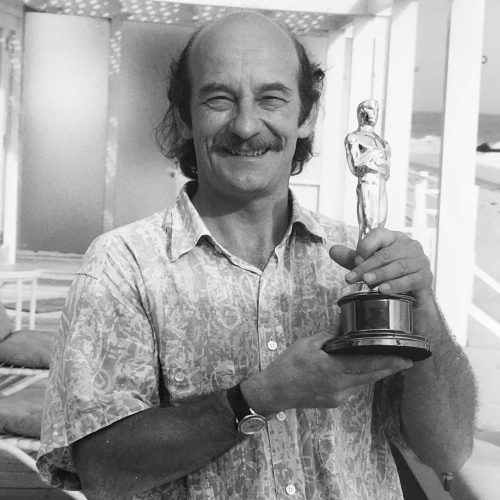Peter BIZIOU was born on August 8, 1944, in Bangor, in the county of Caernarvoshire, Wales / United Kingdom.
His father, Leon Bijou played a key role in his upbringing and shaped his personality, above all as a future professional cinematographer, (the difference in the spelling of the surnames can be easily noted, Peter being Biziou, and his father Bijou, which is probably also the reason for the French pronunciation of his surname).
Growing up under the care of his single father, who was a cinematographer specializing in animated film, things took the expected turn of events – with the apple not falling far from the tree, and Peter stepping into the world of cinema, following in his fathers’ footsteps, and also learning a lot from him while accompanying him on set. He built the foundation for his future vocation as a student at the Paddington Secondary Technical School in London, while later on, in the search for his future calling he gained significant experience by working in the company’s studios on Soho Wardour Street in London, where he proved to be capable of doing various studio jobs. The most useful influence in the development of his skills as a future independent cinematographer was his involvement in the preparatory work and lighting of the sets of commercials and short films. Working alongside more experienced filmmakers also played a major role in his professional growth, including director Robert Freeman, who in 1969, together with co-director Paul Feyder, hired the promising Biziou as a cinematographer in the film “Secret World” / La Promesse, which was his professional baptism of fire. The main role in “Secret World” was given to Jacqueline Bisset thus launching her bright future as a film star.
Biziou achieved his fastest growth and high professional standing internationally by becoming a tandem collaborator with the leading English writer and director Alan Parker, with whom he won his first and only Academy Award in 1988, for the American drama from the racist South “Mississippi Burning”, starring Gene Hackman and Willem Dafoe as two detectives sent by the FBI to investigate the mysterious murders of three local human rights activists in 1964. As is suggested in the title of the film, this ignites a strong racist flame, particularly spurring the racist fanatics of the KKK to take action, who in the name of white supremacy and Christianity, openly motivated by their hatred towards the black population, terrorize and murder anyone who dares to stand in their way. Biziou effectively paints this racist KKK atmosphere, and in fact his Oscar is a well-deserved recognition for his mastery in creating the visual escalation of the drama, as it is symbolically emphasized, in the year when America was at war with itself!
Biziou’s tandem collaboration with Parker is also based on his previous anthological piece from 1982, “Pink Floyd: The Wall”, a portrait of one of the greatest rock bands with an authentic musical and conceptual style, by putting focus on the essentially unforgettable and parabolical in terms of motif: “Another Brick In The Wall”. This symbiosis between the musical and its visual expression reaches a full creative climax precisely in Biziou’s creation. However, the foundation of Biziou’s and Parker’s future tandem collaboration was laid back in 1976 with the film “Bugsy Malone”, which launched the career of another talented future star, Jodie Foster.
One of Biziou’s most significant international promotions took place at the Cannes festival in 1984, when he received the award for best artistic achievement for his visual creation as a cinematographer in the film “Another Country” by director Marek Kanievska.
The crowning jewel of Biziou’s cinematographic career, in its outstanding visual inventiveness, drama and creativity, is the anthological “In the Name of the Father”, shot in 1993, written and directed by Jim Sheridan – the Irishman from the Republic of Ireland (who in 2019, at the 40th anniversary edition of IFFK “Manaki Brothers” in Bitola, was our distinguished guest as a representative of EFA – the European Film Academy). This film is among the many dealing with the IRA syndrome. The main role is played by the outstanding Daniel Day Lewis, in the character of the wrongfully accused Irishman, imprisoned and tried together with his father for a terrorist event that took place in London, which they had nothing to do with, with Emma Thompson in the role of their lawyer. “In the Name of the Father” got seven Academy Award nominations, including the ones for Sheridan and Biziou, yet in the end they were left without the well-earned statues.
In Biziou’s fruitful career, the cooperation with the celebrated British comedy troupe “Monty Python” holds a very peculiar and visually playful, specific place. In 1979 Biziou created “The Life of Brian” with them, a burlesque comedy/parody about the life of Jesus of Nazareth.
In 1981, the visually more effective and more playful (in terms of genres) – the “Time Bandits” emerged from the collaboration with the Python family, directed by Terry Gilliam, who jointly wrote the script with Michael Palin. In addition to the other Pythons, the cast of this film also includes Sean Connery and Shelley Duvall. Thanks to the greatest enfant terrible in the Monty Python troupe – the writer and director Gilliam, the only American-born among the wacky Englishmen, an expert in special effects and animation – Biziou was able to find a reflection in the visual expression and construction of the fantastic journey through time and space, which are indeed the best circumstances for a cinematographer to unleash his imagination and creative freedom.
In 1988, when he won the Oscar for “Mississippi Burns”, Biziou created the film “The World Apart”, where he collaborated as a cinematographer with the double Academy Award winner, Chris Menges, cinematographer and director (another of our laureates of the Golden Camera 300 for Lifetime Achievement). For Biziou, it was certainly major recognition that the experienced Menges chose to collaborate with him on the cinematography of the drama from the then racist/apartheid climate of South Africa.
Ten years later, in 1998, with the Australian Peter Veir, Biziou created “The Truman Show” starring Jim Carrey. The dramatic comedy, peculiar for the way in which it depicts a character whose life becomes the subject-matter of a reality show, gave Biziou new creative freedom precisely in capturing the launching one’s private life in the general commercial – visual TV broadcast!
Biziou collaborated with another one of our laureates, the distinguished English actor Charles Dance, winner of the Special Golden Camera 300 for Outstanding Contribution to World Cinematic Art in 2004, when Dance directed “Ladies in Lavender” with two of the greatest actresses from the English acting tradition, dames Judi Dench and Maggie Smith.
With director Adrian Lyne, Biziou collaborated on the creation of two commercially very effective films with absolute Hollywood stars: in 1986, the erotically electrifying “9 ½ Weeks”, in which Kim Basinger’s sensuality comes to full expression with Mickey Rourke as her partner, and then in 2002 in “Unfaithful” starring the equally attractive acting tandem – Richard Gere and Diane Lane.
Biziou collaborated with another Oscar-winning director – Roland Joffe, with whom he created the “City of Joy” in 1992. With Tom Stoppard, the celebrated theatre author and film screenwriter, but this time as a director, Biziou signed the visualization of his original theatre project “Rosencrantz & Guildenstern are Dead” in 1990.
Other films that should certainly stand out in Biziou’s oeuvre are “Damage”, signed in 1992 by leading French director Louis Malle, with the acting tandem Jeremy Irons and Juliette Binoche playing “forbidden” lovers: and the film “Richard III” (1995), directed by Richard Loncraine, with actor Ian Mckellen in the role of Shakespeare’s infamous king Richard III, but re-interpreted in the context of a fascist dictator threatening England in the 1930s, as an echo/reflection of German fascism in the dawn of World War II.
In addition to the Oscar, Peter Biziou’s rich oeuvre was also decorated with the BAFTA Award in 1990, the Award of the BSC in 1989, as well as the BSC Lifetime Achievement Award in 2019.
Peter Biziou becoming the most recent member of the “Manaki Brothers” Festival Club of Greats finally fulfils our long-standing wish to present him with the Golden Camera 300 for his life’s work and we look forward to meeting him and attending his master class as a laureate in Bitola.
Blagoja Kunovski – Dore


